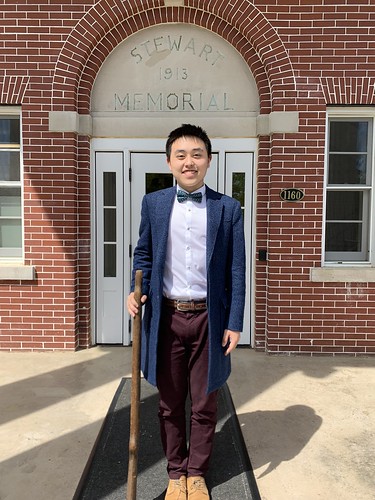Military Training and Enlistment
“It is not the intention of the authorities of the School to turn it into a military school, but there will be military work with drill under competent instructors.” -- School Catalogue, 1916-1917
One important way of which the war impacted the student life was the addition of military drills everyday. Just as the ideal of Preparedness popularized in the student body, the School Administration was quick to recognize the significance of preparing its students militarily. As early as the Spring of 1916, the school started experimenting with daily military drills. In the summer of 1916, four Episcopal faculties attended the Plattsburg camp for reserve officer training, and program of military training solidified in the 1916-1917 school year. Each student’s family was charged $10 for the equipment, and the program began when the U.S. entered the war in April, 1917.
The students were split initially into two companies alphabetically under the command of Williams, Blackford, Heuer, and Pendleton, all of whom attended the camp earlier. In addition, two faculties, Griffith and R. T. Knapp were appointed the “first sergeants of the Company A and Company B,” respectively. The school and baseball practice were curtailed for the two-hour daily drill. Yet, the promptness of the declaration still created chaos on campus. The students had to practice with wooden gun models, and the students’ attitude towards the training was lackluster. Whisper observed that most students treated the drill as an “irksome imposition” and “something to be gotten through with every day with a minimum of interest and effort.”
On the afternoon of June 25th, the school concluded the military program of the school year with a drill competition. After Commandant Cocke offered a few remarks, the companies were drilled in front of a viewing stand. Several military critiques observed the drilling on the stand and decided Company A, under the leadership of Captain Byrd, the winner. Company A received a bugle from Head of School Hoxton as the prize of winning the contest.
During the 1917-1918 school year, in order to further incentivize the student, the school “[secured] from the Government a consignment of Springfield rifles,” which, according to Whisper, brought a“most enlivening effect” upon the student body; the school also issued military uniforms of khaki suits to the students. In fact, the uniform was to be worn “at all time while at School” except holidays, and students were encouraged to bring a “minimum of civilian clothes” to the school. Furthermore, a third company was formed for the newer students.
Yet, the same problem persisted. Whisper wrote that the uniforms provided were “poor and ill fitting,” and ridiculed the drilling as the “ill-begot child of Mars” that “at best [was] stupid.” Jokes aside, the editors advised the student body, “Until drill is considered in the light of a duty rather than an imposition, it is vain to hope for better efficiency.” The implementation of drills also caused conflicts with the athletic program. In an article, the Washington Times observed, “Daily drills of two hours will cut into the football practice significantly.” Thankfully, when the war ended in November, 1918, the military training program was terminated.
Inspired by the wartime patriotism, high school students throughout the U.S. dropped out of school or chose not to attend college in order to enlist in the military. While Episcopal promoted values such as honor and duty, the school often encouraged its students to fulfill their duty to the country by attending college. On April 14th, 1918, the school invited two speakers from University of Virginia. The admission representative, A. L. Kinsolving, Jr., described the life at UVA to the students to attract their interest in studying there. At the same time, the other representative, Professor L. G. Hoxton talked about how all branches of science were used in the military service during the Great War, suggesting that one could still support the U.S.’s war efforts by studying science at college.
Also, in the May, 1918 issue of the Chronicle, the editorial published a letter written by P. P. Claxton, U.S. Commissioner of Education, titled “Enlist--and Go to College,” to help the Episcopal students determine their future. The letter encouraged the students to stay in college and enlist in the military training programs of the collegiate institutions, so that they could both prepare militarily for potential mobilization and continue their study. The Chronicle encouraged the students to consider this “generous offer” given by the U.S. government.










